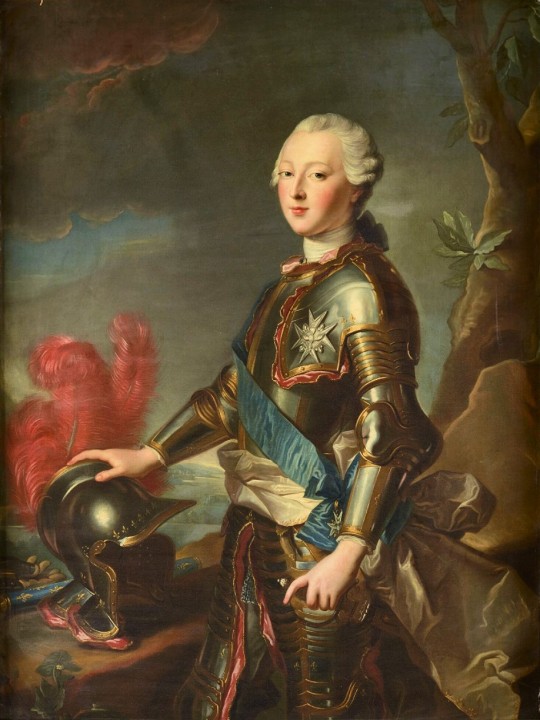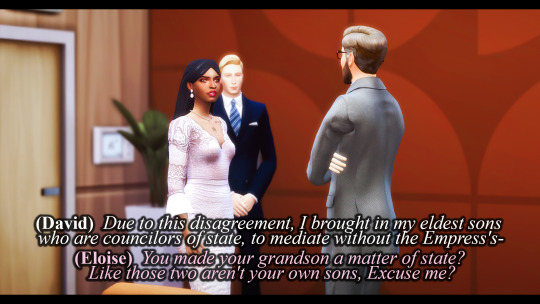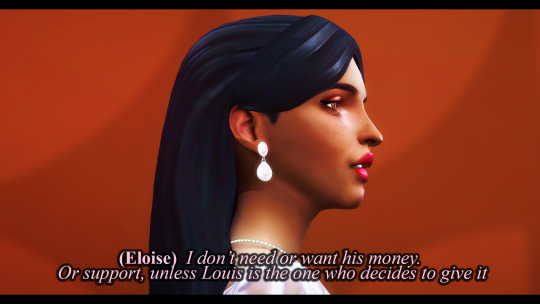#prince du sang
Explore tagged Tumblr posts
Text

Portrait of Louis V Joseph, Prince of Condé (1736-1818), son of Louis Henri, Duke of Bourbon. After Nattier.
#royaume de france#maison de bourbon#bourbon condé#louis v joseph#duc de bourbon#duché de bourbon#prince du sang#kingdom of france#house of bourbon#in armour#jean marc nattier#royalty
10 notes
·
View notes
Text

Antoine de Bourbon (1518-1562) by Jean-Marie Ribou.
#jean marie ribou#antoine de bourbon#roi de navarre#vive le roi#royaume de navarre#royaume de france#prince du sang#antoine de navarre#maison de bourbon#jean-marie ribou
6 notes
·
View notes
Text
Tagged by: @catwalkninja
Rules: without naming them, post a gif of ten of your favourite ships (any media), then tag ten people to do the same.
Any media? Well, gifs for books are harder, so I gave preference to shows. No specific order
1.

2.

3.

4.

5.

6.

Beautiful art by @marinevhs
7.

8.

9.

10.

I tag: @godofmishfortunes
#chain challenges#bad buddy#pat x pran#heaven official's blessing#hua cheng x xie lian#pretty noona who buys me food#joon hee x jin ah#old fashioned cupcake#togawa x nozue#my father is strange#hye young x jung hwan#captive prince#damianos x laurent#kinnporsche#kim x porchay#red white royal blue#alex x henry#semantic error#jae young x sang woo#jazz for two#du yun x ju ha#thai bl#ml book#jbl#kdrama#kbl
6 notes
·
View notes
Text
I saw this letter from Camille to his father at an auction website and the crossed out sections, missing from the transcribed version, are interesting.


The letter is referenced in Leuwers’ biography and appears this way in Matton’s Correspondence Inédite:

The actual letter had two crossed out sections:

After asking his father to send subscriptions, he crosses out “Je compte deja parmi mes abonnés deux princes du sang.” Probably because he realized that bragging about getting subscriptions from the aristocracy is not very republican, he extra crosses out “deux princes du sang.”

(Although I wonder if this is accurate, because it looks like more words than “deux princes du sang” to me.)
The other is a minor change, from “à deux heures du matin” to “après minuit.” It doesn’t change the meaning, it’s just a small stylistic choice. The kind of thing that you get to see in a letter that’s lost in transcription.
#who knows where it is now#I wish the photos were higher res so it was possible to really decipher that princes du sang bit#camille desmoulins#french revolution
26 notes
·
View notes
Text

Page 7/19 ! Tout. Va. Bien.
Page 6 / Page 8 (pour lire du début, c'est ici!)
Cases individuelles sous le readmore!




#cartouche prince des faubourgs#j'ai commencé à illustrer ce truc en me disant ''bon on reste un peu dans les limites du canon cette fois''#sauf que bon euh. disons le canon mais avec un peu plus de sang#flashbic draws stuff
4 notes
·
View notes
Text

||COUNTDOWN ||SEASON 2 EPISODE 02 || NOT IN SCOTLAND ANYMORE||
#83daysofoutlander☆
I closed the door of the drawing room quietly behind me and stood still a moment, gathering courage. I essayed a restorative deep breath, but the tightness of the whalebone corseting made it come out as a strangled gasp. Jamie, immersed in a handful of shipping orders, glanced up at the sound and froze, eyes wide. His mouth opened, but he made no sound. “How do you like it?” Handling the train a bit gingerly, I stepped down into the room, swaying gently as the seamstress had instructed, to show off the filmy gussets of silk plissé let into the overskirt. Jamie shut his mouth and blinked several times. “It’s … ah … red, isn’t it?” he observed. “Rather.” Sang-du-Christ, to be exact. Christ’s blood, the most fashionable color of the season, or so I had been given to understand. “Not every woman could wear it, Madame,” the seamstress had declared, speech unhampered by a mouthful of pins. “But you, with that skin! Mother of God, you’ll have men crawling under your skirt all night!” “If one tries, I’ll stamp on his fingers,” I said. That, after all, was not at all the intended effect. But I did mean to be visible. Jamie had urged me to have something made that would make me stand out in the crowd. Early-morning fog notwithstanding, the King had evidently remembered him from his appearance at the lever, and we had been invited to a ball at Versailles. “I’ll need to get the ears of the men with the money,” Jamie had said, making plans with me earlier. “And as I’ve neither great position nor power myself, it will have to be managed by making them seek my company.” He heaved a sigh, looking at me, decidedly unglamorous in my woolen bedgown. “And I’m afraid in Paris that means we’ll have to go out a bit in society; appear at Court, if it can be managed. They’ll know I’m a Scot; it will be natural for folk to ask me about Prince Charles, and whether Scotland is eagerly awaiting the return of the Stuarts. Then I can assure them discreetly that most Scots would pay a good price not to have the Stuarts back again—though it goes against the grain a bit to say so.” “Yes, you’d better be discreet,” I agreed. “Or the Bonnie Prince may set the dogs on you next time you go to visit.” In accordance with his plan to keep abreast of Charles’s activities, Jamie had been paying weekly duty calls on the small house at Montmartre. Jamie smiled briefly. “Aye. Well, so far as His Highness, and the Jacobite supporters are concerned, I’m a loyal upholder of the Stuart cause. And so long as Charles Stuart is not received at Court and I am, the chances of his finding out what I’m saying there are not great.
Jacobites in Paris keep to themselves, as a rule. For the one thing, they haven’t the money to appear in fashionable circles. But we have, thanks to Jared.” Jared had concurred—for entirely different reasons—in Jamie’s proposal that we widen the scope of Jared’s usual business entertaining, so that the French nobility and the heads of the wealthy banking families might beat a path to our door, there to be seduced and cozened with Rhenish wine, good talk, fine entertainment, and large quantities of the good Scotch whisky that Murtagh had spent the last two weeks shepherding across the Channel and overland to our cellars. “It’s entertainment of one kind or another that draws them, ye ken,” Jamie had said, sketching out plans on the back of a broadsheet poem describing the scurrilous affair between the Comte de Sévigny and the wife of the Minister of Agriculture. “All the nobility care about is appearances. So to start with, we must offer them something interesting to look at.” Judging from the stunned look on his face now, I had made a good beginning. I sashayed a bit, making the huge overskirt swing like a bell. “Not bad, is it?” I asked. “Very visible, at any rate.” He found his voice at last. “Visible?” he croaked. “Visible? God, I can see every inch of ye, down to the third rib!” I peered downward. “No, you can’t. That isn’t me under the lace, it’s a fining of white charmeuse.” “Aye well, it looks like you!” He came closer, bending to inspect the bodice of the dress. He peered into my cleavage. “Christ, I can see down to your navel! Surely ye dinna mean to go out in public like that!” I bristled a bit at this. I had been feeling a trifle nervous myself over the general revealingness of the dress, the fashionable sketches the seamstress had shown me notwithstanding. But Jamie’s reaction was making me feel defensive, and thus rebellious. “You told me to be visible,” I reminded him. “And this is absolutely nothing, compared to the latest Court fashions. Believe me, I shall be modesty personified, in comparison with Madame de Pérignon and the Duchesse de Rouen.” I put my hands on my hips and surveyed him coldly. “Or do you want me to appear at Court in my green velvet?” Jamie averted his eyes from my décolletage and tightened his lips. “Mphm,” he said, looking as Scotch as possible. Trying to be conciliatory, I came closer and laid a hand on his arm. “Come now,” I said. “You’ve been at Court before; surely you know what ladies dress like. You know this isn’t terribly extreme by those standards.” He glanced down at me and smiled, a trifle shamefaced
“Aye,” he said. “Aye, that’s true. It’s only … well, you’re my wife, Sassenach. I dinna want other men to look at you the way I’ve looked at those ladies.” I laughed and put my hands behind his neck, pulling him down to kiss me. He held me around the waist, his thumbs unconsciously stroking the softness of the red silk where it sheathed my torso. His touch traveled upward, sliding across the slipperiness of the fabric to the nape of my neck. His other hand grasped the soft roundness of my breast, swelling up above the tethering grip of the corsets, voluptuously free under a single layer of sheer silk. He let go at last and straightened up, shaking his head doubtfully. “I suppose ye’ll have to wear it, Sassenach, but for Christ’s sake be careful.” “Careful? Of what?” His mouth twisted in a rueful smile. “Lord, woman, have ye no notion what ye look like in that gown? It makes me want to commit 💥 on the spot. And these damned frog-eaters havena got my restraint.” He frowned slightly. “You couldna … cover it up at bit at the top?” He waved a large hand vaguely in the direction of his own lace jabot, secured with a ruby stickpin. “A … ruffle or something? A handkerchief?” “Men,” I told him, “have no notion of fashion. But not to worry. The seamstress says that’s what the fan is for.” I flipped the matching lace-trimmed fan open with a gesture that had taken fifteen minutes’ practice to perfect, and fluttered it enticingly over my bosom. Jamie blinked meditatively at this performance, then turned to take my cloak from the wardrobe.
“Do me the one favor, Sassenach,” he said, draping the heavy velvet over my shoulders. “Take a larger fan.”
9 THE SPLENDORS OF VERSAILLES
#outlander#the frasers#outlanderedit#outlander starz#jamie fraser#outlander series#outlander fanart#samheughan#jamie&claire#jamie and claire#outlander books#dr claire randall#claire beauchamp#claire fraser#caitrionabalfe#outlander season 2#outlander 2x02
69 notes
·
View notes
Text

Nous tous savons très bien que ce Noël a des accents un peu particuliers. Il ressemble à une veille de bataille, quand les hommes passaient de tente en tente, une bouteille à la main, flanqué de quelque compère, au fait de la situation et de son issue possible, probable, certaine. Équipage à la dérive, la peur au ventre et l’orgueil à fleur de sabre.
Boire et rire, boire un peu trop et rire trop fort, à tenir la camarde éveillée, à l’agonir d’insultes et de mots gros comme des boulets. Saloperie qui affute sa faux, qui veillera personnellement à ce que personne ne sorte vivant de ce rang – qui fauché par la mitraille, qui éparpillé par le canon, gerbes de sang, puanteurs tripardes. Le tambour bat au rythme des cœurs, cœurs frénétiques pompant pour chaque pas, pas de plomb dans la boue sale du matin, semelles tenues, valves dilatées, artères tendues...
La France sait bien que cet assaut est sans issue. Crise de régime, oligarchie, médiocratie. La flûte des gamins sonne l’assaut au loin, sonne pour rien, sonne pour BFM et TF1. Déficits abyssaux, illusoires, fictions financières qui voudraient dire aux peuples la fin de leur histoire. Français, réveillez-vous, ne soyez pas les derniers à vous révolter, montrez à l’Europe qu’il coule encore en vous un accent de vérité, un amour du vrai, une parole de justice, une envie d’avenir.
Chassez de la maison les monstres calculateurs, les faiseurs de prince, princes d’illusion, narcissiques fossoyeurs de votre histoire. Hurlez à pleins poumons votre envie d’exister, de chasser les intrus, de punir les assassins. Soyez-vous et re-vous, enfants de putain. Battez-vous, bordel, gagnez votre pain, élevez vos enfants et célébrez Noël, enfin.
J.-M. M.
23 notes
·
View notes
Text

















⚜ Le Cabinet Noir | Episode III, N°3 | Belgisim, 15 Thermidor An 230
During the Europesim summit, Napoleon V tried to create a dialogue between the leaders of the Empire of Pierreland (Emperor David) and the Union of Iona (Queen Viviana II). This initiative proved to be of little avail.
Collaboration with @funkyllama and @officalroyalsofpierreland
Beginning ▬ Previous ▬ Next
⚜ Traduction française
Durant le sommet d'Europesim, Napoléon V tente de créer un dialogue entre les dirigeants de l'empire de Pierreland (l'empereur David) et de l'Union d'Iona (la reine Viviana II). Cette initiative ne s'avère que peu fructueuse : les tensions sont désormais fortes entre les pays européensims.
(Napoléon) Ce ne sera pas agréable, mais il va falloir que vous trouviez un terrain d'entente
(David) Je suis d'accord. Nous sommes tous des adultes responsables ici, et... pour être franc, certaines vérités ne devront pas quitter cette pièce, pas encore
(Eloise) Je ne crois pas que mes enfants soient un sujet d'État pertinent qui relève de la politique européennesim, du moins avant la majorité. N'est-ce pas David ? De parent à parent (Napoléon) S'il vous plaît...
(David) Quand j'ai reçu votre lettre... Je craignais que mon fils ne soit pas assez mâture pour assumer sa paternité. J'ai consulté Katalina, qui n'est pas d'accord et veut que Louis soit partie intégrante de la vie de Lenerd. À cause de ce désaccord, j'ai demandé à mes deux fils aînés et conseillers d'État... (Eloise) Vous considérez que votre petit-fils est une affaire d'état ? Comme ces deux-là qui ne sont pas vos fils ? Pardon ?!
(David) Ils sont mes fils. Felipe par le sang et Edmund par la loi. Et oui, mon petit-fils est devenu une affaire d'État ! Le père n'a pas été informé du fait que vous soyez enceinte ! (Eloise) Comme s'il ne savait pas compter jusqu'à 9...
(Napoléon) David, Lenerd devrait être reconnu par votre empire... Sinon mon filleul va...
(David) Nom de Dieu, j'essaye d'admettre mes fautes-
(Napoléon) S'il vous plaît, du calme. Repoussons ce rendez-vous...
(Eloise) Je n'ai pas besoin ni ne veut de son argent. Ni même du soutien, à moins que Louis en soit l'instigateur
(David) Eloise, je vous prie de bien vouloir croire que tout le soutien et l'argent que je vous ferai parvenir sera une attention de Louis
(Eloise) Le même Louis que vous maintenez dans l'ignorance ? Non, merci. (David) Pour le moment. Je ne pense pas que Louis devrait-
(Eloise) Vous, vous vous, VOUS. Il s'agit de mon bébé. De son bébé. Pourquoi pensez-vous que vous pouvez l'éloigner de son fils ?
(David) Le garçon n'a que 19 ans. Il ne peut pas gérer ça !
(Eloise) À 19 ans j'aurais assumé les conséquences de mes putains d'actions
(David) Donne-nous 10 ans, à Katalina et moi. Il sera alors élevé comme un prince de Pierreland avec tous les droits qu'ils lui reviennent et je le reconnaîtrai comme mon petit fils. Je dirai au public la vérité
#ts4#simparte#ts4 royal#royal simblr#sims 4 royal#sim : louis#sims 4 fr#sims 4#ts4 royalty#sims 4 royalty#le cabinet noir#episode iii#europesim#collab : funkyllama#collab : officalroyalsofpierreland#sim : eloise#sim : david#sims 4 royal family#ts4 royal family#ts4 royal simblr#royal sims
51 notes
·
View notes
Text
The Year 1817
Les Mis Letters reading club explores one chapter of Les Misérables every day. Join us on Discord, Substack - or share your thoughts right here on tumblr - today's tag is #lm 1.3.1
1817 is the year which Louis XVIII., with a certain royal assurance which was not wanting in pride, entitled the twenty-second of his reign. It is the year in which M. Bruguière de Sorsum was celebrated. All the hairdressers’ shops, hoping for powder and the return of the royal bird, were besmeared with azure and decked with fleurs-de-lys. It was the candid time at which Count Lynch sat every Sunday as church-warden in the church-warden’s pew of Saint-Germain-des-Prés, in his costume of a peer of France, with his red ribbon and his long nose and the majesty of profile peculiar to a man who has performed a brilliant action. The brilliant action performed by M. Lynch was this: being mayor of Bordeaux, on the 12th of March, 1814, he had surrendered the city a little too promptly to M. the Duke d’Angoulême. Hence his peerage. In 1817 fashion swallowed up little boys of from four to six years of age in vast caps of morocco leather with ear-tabs resembling Esquimaux mitres. The French army was dressed in white, after the mode of the Austrian; the regiments were called legions; instead of numbers they bore the names of departments; Napoleon was at St. Helena; and since England refused him green cloth, he was having his old coats turned. In 1817 Pelligrini sang; Mademoiselle Bigottini danced; Potier reigned; Odry did not yet exist. Madame Saqui had succeeded to Forioso. There were still Prussians in France. M. Delalot was a personage. Legitimacy had just asserted itself by cutting off the hand, then the head, of Pleignier, of Carbonneau, and of Tolleron. The Prince de Talleyrand, grand chamberlain, and the Abbé Louis, appointed minister of finance, laughed as they looked at each other, with the laugh of the two augurs; both of them had celebrated, on the 14th of July, 1790, the mass of federation in the Champ de Mars; Talleyrand had said it as bishop, Louis had served it in the capacity of deacon. In 1817, in the side-alleys of this same Champ de Mars, two great cylinders of wood might have been seen lying in the rain, rotting amid the grass, painted blue, with traces of eagles and bees, from which the gilding was falling. These were the columns which two years before had upheld the Emperor’s platform in the Champ de Mai. They were blackened here and there with the scorches of the bivouac of Austrians encamped near Gros-Caillou. Two or three of these columns had disappeared in these bivouac fires, and had warmed the large hands of the Imperial troops. The Field of May had this remarkable point: that it had been held in the month of June and in the Field of March (Mars). In this year, 1817, two things were popular: the Voltaire-Touquet and the snuff-box <i>à la Charter</i>. The most recent Parisian sensation was the crime of Dautun, who had thrown his brother’s head into the fountain of the Flower-Market.
They had begun to feel anxious at the Naval Department, on account of the lack of news from that fatal frigate, <i>The Medusa</i>, which was destined to cover Chaumareix with infamy and Géricault with glory. Colonel Selves was going to Egypt to become Soliman-Pasha. The palace of Thermes, in the Rue de La Harpe, served as a shop for a cooper. On the platform of the octagonal tower of the Hotel de Cluny, the little shed of boards, which had served as an observatory to Messier, the naval astronomer under Louis XVI., was still to be seen. The Duchesse de Duras read to three or four friends her unpublished <i>Ourika</i>, in her boudoir furnished by X. in sky-blue satin. The N’s were scratched off the Louvre. The bridge of Austerlitz had abdicated, and was entitled the bridge of the King’s Garden [du Jardin du Roi], a double enigma, which disguised the bridge of Austerlitz and the Jardin des Plantes at one stroke. Louis XVIII., much preoccupied while annotating Horace with the corner of his finger-nail, heroes who have become emperors, and makers of wooden shoes who have become dauphins, had two anxieties,—Napoleon and Mathurin Bruneau. The French Academy had given for its prize subject, <i>The Happiness procured through Study</i>. M. Bellart was officially eloquent. In his shadow could be seen germinating that future advocate-general of Broë, dedicated to the sarcasms of Paul-Louis Courier. There was a false Chateaubriand, named Marchangy, in the interim, until there should be a false Marchangy, named d’Arlincourt. <i>Claire d’Albe</i> and <i>Malek-Adel</i> were masterpieces; Madame Cottin was proclaimed the chief writer of the epoch. The Institute had the academician, Napoleon Bonaparte, stricken from its list of members. A royal ordinance erected Angoulême into a naval school; for the Duc d’Angoulême, being lord high admiral, it was evident that the city of Angoulême had all the qualities of a seaport; otherwise the monarchical principle would have received a wound. In the Council of Ministers the question was agitated whether vignettes representing slack-rope performances, which adorned Franconi’s advertising posters, and which attracted throngs of street urchins, should be tolerated. M. Paër, the author of <i>Agnese</i>, a good sort of fellow, with a square face and a wart on his cheek, directed the little private concerts of the Marquise de Sasenaye in the Rue Ville l’Évêque. All the young girls were singing the <i>Hermit of Saint-Avelle</i>, with words by Edmond Géraud. <i>The Yellow Dwarf</i> was transferred into <i>Mirror</i>. The Café Lemblin stood up for the Emperor, against the Café Valois, which upheld the Bourbons. The Duc de Berri, already surveyed from the shadow by Louvel, had just been married to a princess of Sicily. Madame de Staël had died a year previously. The body-guard hissed Mademoiselle Mars. The grand newspapers were all very small. Their form was restricted, but their liberty was great. The <i>Constitutionnel</i> was constitutional. <i>La Minerve</i> called Chateaubriand <i>Chateaubriant</i>. That <i>t</i> made the good middle-class people laugh heartily at the expense of the great writer. In journals which sold themselves, prostituted journalists, insulted the exiles of 1815. David had no longer any talent, Arnault had no longer any wit, Carnot was no longer honest, Soult had won no battles; it is true that Napoleon had no longer any genius. No one is ignorant of the fact that letters sent to an exile by post very rarely reached him, as the police made it their religious duty to intercept them. This is no new fact; Descartes complained of it in his exile. Now David, having, in a Belgian publication, shown some displeasure at not receiving letters which had been written to him, it struck the royalist journals as amusing; and they derided the prescribed man well on this occasion. What separated two men more than an abyss was to say, the <i>regicides</i>, or to say the <i>voters</i>; to say the <i>enemies</i>, or to say the <i>allies</i>; to say <i>Napoleon</i>, or to say <i>Buonaparte</i>.
All sensible people were agreed that the era of revolution had been closed forever by King Louis XVIII., surnamed “The Immortal Author of the Charter.” On the platform of the Pont-Neuf, the word <i>Redivivus</i> was carved on the pedestal that awaited the statue of Henry IV. M. Piet, in the Rue Thérèse, No. 4, was making the rough draft of his privy assembly to consolidate the monarchy. The leaders of the Right said at grave conjunctures, “We must write to Bacot.” MM. Canuel, O’Mahoney, and De Chappedelaine were preparing the sketch, to some extent with Monsieur’s approval, of what was to become later on “The Conspiracy of the Bord de l’Eau”—of the waterside. L’Épingle Noire was already plotting in his own quarter. Delaverderie was conferring with Trogoff. M. Decazes, who was liberal to a degree, reigned. Chateaubriand stood every morning at his window at No. 27 Rue Saint-Dominique, clad in footed trousers, and slippers, with a madras kerchief knotted over his gray hair, with his eyes fixed on a mirror, a complete set of dentist’s instruments spread out before him, cleaning his teeth, which were charming, while he dictated <i>The Monarchy according to the Charter</i> to M. Pilorge, his secretary. Criticism, assuming an authoritative tone, preferred Lafon to Talma. M. de Féletez signed himself A.; M. Hoffmann signed himself Z. Charles Nodier wrote <i>Thérèse Aubert</i>.Divorce was abolished. Lyceums called themselves colleges. The collegians, decorated on the collar with a golden fleur-de-lys, fought each other <i>apropos</i> of the King of Rome. The counter-police of the château had denounced to her Royal Highness Madame, the portrait, everywhere exhibited, of M. the Duc d’Orléans, who made a better appearance in his uniform of a colonel-general of hussars than M. the Duc de Berri, in his uniform of colonel-general of dragoons—a serious inconvenience. The city of Paris was having the dome of the Invalides regilded at its own expense. Serious men asked themselves what M. de Trinquelague would do on such or such an occasion; M. Clausel de Montals differed on divers points from M. Clausel de Coussergues; M. de Salaberry was not satisfied. The comedian Picard, who belonged to the Academy, which the comedian Molière had not been able to do, had <i>The Two Philiberts</i> played at the Odéon, upon whose pediment the removal of the letters still allowed THEATRE OF THE EMPRESS to be plainly read. People took part for or against Cugnet de Montarlot. Fabvier was factious; Bavoux was revolutionary. The Liberal, Pélicier, published an edition of Voltaire, with the following title: <i>Works of Voltaire</i>, of the French Academy. “That will attract purchasers,” said the ingenious editor. The general opinion was that M. Charles Loyson would be the genius of the century; envy was beginning to gnaw at him—a sign of glory; and this verse was composed on him:—
“Even when Loyson steals, one feels that he has paws.”
As Cardinal Fesch refused to resign, M. de Pins, Archbishop of Amasie, administered the diocese of Lyons. The quarrel over the valley of Dappes was begun between Switzerland and France by a memoir from Captain, afterwards General Dufour. Saint-Simon, ignored, was erecting his sublime dream. There was a celebrated Fourier at the Academy of Science, whom posterity has forgotten; and in some garret an obscure Fourier, whom the future will recall. Lord Byron was beginning to make his mark; a note to a poem by Millevoye introduced him to France in these terms: <i>a certain Lord Baron</i>. David d’Angers was trying to work in marble. The Abbé Caron was speaking, in terms of praise, to a private gathering of seminarists in the blind alley of Feuillantines, of an unknown priest, named Félicité-Robert, who, at a latter date, became Lamennais. A thing which smoked and clattered on the Seine with the noise of a swimming dog went and came beneath the windows of the Tuileries, from the Pont Royal to the Pont Louis XV.; it was a piece of mechanism which was not good for much; a sort of plaything, the idle dream of a dream-ridden inventor; an utopia—a steamboat. The Parisians stared indifferently at this useless thing. M. de Vaublanc, the reformer of the Institute by a coup d’état, the distinguished author of numerous academicians, ordinances, and batches of members, after having created them, could not succeed in becoming one himself. The Faubourg Saint-Germain and the pavilion de Marsan wished to have M. Delaveau for prefect of police, on account of his piety. Dupuytren and Récamier entered into a quarrel in the amphitheatre of the School of Medicine, and threatened each other with their fists on the subject of the divinity of Jesus Christ. Cuvier, with one eye on Genesis and the other on nature, tried to please bigoted reaction by reconciling fossils with texts and by making mastodons flatter Moses.
M. François de Neufchâteau, the praiseworthy cultivator of the memory of Parmentier, made a thousand efforts to have <i>pomme de terre</i> [potato] pronounced <i>parmentière</i>, and succeeded therein not at all. The Abbé Grégoire, ex-bishop, ex-conventionary, ex-senator, had passed, in the royalist polemics, to the state of “Infamous Grégoire.” The locution of which we have made use—<i>passed to the state of</i>—has been condemned as a neologism by M. Royer Collard. Under the third arch of the Pont de Jéna, the new stone with which, the two years previously, the mining aperture made by Blücher to blow up the bridge had been stopped up, was still recognizable on account of its whiteness. Justice summoned to its bar a man who, on seeing the Comte d’Artois enter Notre Dame, had said aloud: <i>“Sapristi! I regret the time when I saw Bonaparte and Talma enter the Bel Sauvage, arm in arm.”</i> A seditious utterance. Six months in prison. Traitors showed themselves unbuttoned; men who had gone over to the enemy on the eve of battle made no secret of their recompense, and strutted immodestly in the light of day, in the cynicism of riches and dignities; deserters from Ligny and Quatre-Bras, in the brazenness of their well-paid turpitude, exhibited their devotion to the monarchy in the most barefaced manner.
This is what floats up confusedly, pell-mell, for the year 1817, and is now forgotten. History neglects nearly all these particulars, and cannot do otherwise; the infinity would overwhelm it. Nevertheless, these details, which are wrongly called trivial,—there are no trivial facts in humanity, nor little leaves in vegetation,—are useful. It is of the physiognomy of the years that the physiognomy of the centuries is composed. In this year of 1817 four young Parisians arranged “a fine farce.”
12 notes
·
View notes
Text
What Once Was
Fandom: Vying for Versailles (Romance Club)
Rating: Teen
Warnings: none
Summary: Renee married someone else. But what happens when Alexandre comes back into her life?

“Madame, you have a visitor.”
Renée looked up from her writing desk curiously. She hadn’t been expecting anyone. “Who is it, Beatrice?”
Beatrice had served Renee since she had first set foot in Versailles all those years ago. She had risen from lady’s maid to maîtresse d'hôtel. Her duties now involved overseeing all the other household servants at Chateau de Marly.
“It’s Monsieur Bontemps, Madame.”
The door to the study swung wide as the mistress of house backed away, revealing Alexandre, his fingers twisting nervously at the hat clasped in his hands.
Renee rose from her desk with surprised delight and swept across the room to greet him with a hug. “Alexandre! This is a pleasant surprise! Wait….” She drew back with a worried crease across her brow, “Is all well? The king—”
“The king is fine, Madame.”
Her good mood faltered as her eyes tracked his face noting the agitation in his stance. Very little rattled the king’s spymaster. “Then why are you here?”
“I was hoping we could have a private conversation.” His eyes darted around the room. “May I come in?”
“Certainly, but I think we would be more comfortable in the small sitting room.” She stepped out of the study and led him down the hallway to the smallest of the sitting rooms. It was cozy, plush, and private.
She gave Beatrice instructions to send a maid in with tea service then she shut the door. Turning back to him, she crossed her arms and studied him closely.
He was fidgety, clearly wound up about something, which was completely out of character for him. She couldn’t help the smile that crawled across her face as she took in his agitation. “Do I still make you nervous, Alexandre?”
“You do have a way of knocking my equilibrium off balance, Madame.” He gave her a small smile.
The affection and heat in his gaze sent butterflies exploding through her stomach. “That is good to know, Monsieur.”
He arched an eyebrow skeptically, “You think me indifferent to you?”
“Perhaps.”
“I could never be indifferent to you.” The pure, undisguised longing on his face sent shivers cascading down her spine.
There was a brief lull in their conversation as the tea was served. Renee watched the maid retreat as she stirred her tea. With her eyes focused on the cup in her hand, she softly said, “You should have stayed.”
“Renee…I couldn’t stay in close proximity to you knowing I could never touch you again.”
She glanced up at him and her tone was sharp as she told him, “Those were the choices you made.”
He sighed as he carefully sat his cup on the table. It was the same argument they’d had before he had left for Geneva to serve the king’s interest in Switzerland. “You didn’t choose me.”
“I did. I simply didn’t choose only you,” she reminded him. “And it’s not like you were ever going to marry me anyway.”
“A spymaster—”
“I know. Believe me, I remember all your excuses.”
“They weren’t excuses.”
“Weren’t they?”
He didn’t answer. He had told her that they could never be a couple. He hadn’t had a noble title back then and his work made it almost impossible to conduct a love affair. But when she had accepted a proposal from the Prince du Sang, it had felt like a knife plunged into his heart.
He drew in a deep breath and decided to tell her the truth. “There’s something you don’t know, Renee. I did approach Louis about a possible match. The king had been offering to ennoble me for years. I thought, maybe…”
Renee jerked in surprise, nearly spilling her tea in the process, “What?”
“My request was rejected out of hand and when Philippe got down on one knee in front of the entire court a mere day later, I understood why.”
Louis loved him like a brother. But Philippe was his brother. And he had probably asked first. The prince was a better match for her anyway. He knew that.
Renee quickly sat her cup down and tried to quell the shaking in her hands. “Alexandre…why didn’t you tell me?”
“After witnessing firsthand your pure joy at accepting another man’s proposal? What would have been the point?” He had, instead, determined to keep his distance from her.
And yet when their paths crossed, he had found that he still could not resist her. “Do you remember that night in Paris, right before your wedding?”
Madame de France, princess, duchess, and marquise did not blush easily, but her cheeks colored at the reminder. “Of course I do. But why are you bringing that up? Why are you bringing any of it up now?”
“Pardon?”
“Why discuss these things now? After all this time?”
“Ah, yes.” And here was the reason for his visit. “Do you remember when you told me that you would recognize me anywhere?”
“Yes. And you said the same. What does that have to do with why you’re here?”
“Only that I by chance saw you last time I was in Paris on the king’s business. I only saw your profile as you climbed into your carriage, but I knew it was you.”
“And you didn’t think to say hello?”
“I started to but then I saw your son.”
“Louis-Philippe?”
“Yes. One of the servants handed him up into the carriage to you and I got a clear view of his face, Renee.”
Her heart stopped. “And?”
“And he favors neither the prince nor a certain count that you are overly fond of.”
She ignored his reference to Armand as her heart started to thump even harder. She knew exactly who the child favored but she wasn’t going to make this easy on him. Her hands and her voice were steady as she looked him directly in the eye. “What are you asking me, Alexandre?”
“Is he….is he mine?”
She jumped up from her seat and stalked across the room to stare out the window. After a long pause, she replied, “You are not a father in the way that Philippe is. You do not tuck him into bed at night nor ease his fears when the thunder booms. He does not know you.”
He stood and followed her across the room, resting a hand on her shoulder. “That’s not what I’m asking, and you know it.”
Without turning to look at him, she whispered, “Yes, he was conceived that night in Paris.”
Alexandre’s world tilted on its axis. He had known, of course, the moment he had seen the child’s face. But to have confirmation…. He dropped his hand and stepped away from her. “Why didn’t you tell me?”
Anger flared through her as she spun to face him and flung his own words back at him. “What would have been the point? You ran away from me fast enough the moment you didn’t like my choices.”
“But a child, Renee!”
“By the time I knew I was with child, I was already married! What would you have had me do? Put it in a letter so your enemies could use it against us both? You well know how easy it is to intercept correspondence.”
He nodded in acquiescence. He could not fault her logic. “And the Prince du Sang... does he….”
“Philippe knows. He does not care.”
“I find that hard to believe, Madame.”
“Did you think we were cuckolding him every time we were together?”
“Well…”
“I told you, before he even proposed, what our arrangement was!”
“Yes, but I—”
“You what? You thought I was lying?” She stepped closer. So close she could smell the vanilla and cardamom scent that always clung to him. So close that she could feel the heat radiating from him, sense the tension in his body, “I may lie to everyone else in service to my king and my country, but I have never lied to you nor him! I do not lie to the people that I love.”
Alexandre froze, shock, pleasure, and disbelief coursing through him at her words. She loved him?
Oblivious to his reaction to her unintentional confession, she plowed on. “And your assertation that I would have divided loyalties was preposterous! My loyalty to my husband would never put me at cross purposes with you, Alexandre and you know it! Philippe loves his brother and is loyal to him. Furthermore, I do not tell him everything that I know or that I do. He understands and respects the need for discretion when it comes to my duties as a spymaster! He would never ask me to betray—”
“Alright! Alright!” He held both hands up in surrender with a bemused chuckle.
“It’s not funny, Alexandre!” She stood in the middle of the room, just inches from him, cheeks red and chest heaving with emotion.
He was struck nearly speechless by her beauty. She was even more breathtaking when she was angry. How was that possible? He took an involuntary step toward her.
She froze, her eyes trained on him, but she didn’t back away.
He took another step toward her, this one purposeful.
They stood, unmoving, staring into each other’s eyes; two hearts pounding in anticipation. He lifted a hand and reached out for her just as the sitting room door banged open.
“There you are, my love! I—oh! I didn’t realize we had company.” The prince stopped short, causing the chevalier who had been hot on his heels to collide into his backside.
Alexandre jerked his hand back and stepped away awkwardly. “My prince! I…” he executed a low bow. “So lovely to see you again.”
Philippe’s eyes took in the valet’s flushed and guilty expression and then his wife’s stoic demeanor. Renee had not backed away when he entered the room. She had stood her ground. Her ire was evident and he smothered a smile. He understood everything. “It’s always a pleasure to see you, Alexandre, but let’s not pretend you came here for me.”
“I….” For the first time in his life, Alexandre was struck completely speechless.
Renee finally moved, closing the distance to greet her husband with a hug and a quick peck on the cheek. She murmured in his ear, “He knows about Louie.”
“Hm,” he hugged her back, but his gaze was trained on his brother’s spymaster.
Renee moved around her husband to greet the chevalier with the same hug and kiss she had just given her husband. “How was grouse hunting?”
“As usual, we didn’t find a single grouse but at least we didn’t end up drunk in a fountain again.” The chevalier laughed at his own joke as he returned her hug. Not a day passed that he didn’t count his blessings.
There had been a time when the king had been adamant that Philippe make a political marriage, likely to some English noblewoman who would expect fidelity from him. He would forever be grateful that Louis had allowed the prince to marry Renee and that Renee had never blinked at the relationship between the two men. Now he practically lived at Chateau de Marly and was both a godfather and cherished uncle to their son. They functioned very well as a threesome and while his whole heart belonged to the prince, he wasn’t completely indifferent to Renee.
He also liked the life they had built together very much so he glared suspiciously at the intruder. “Why are you here, Monsieur Bontemps?”
Finally recovering, Alexander stiffly replied, “I had some…business to discuss with the duchess.”
Renee snorted. “Business? Is that what this is, Alexandre?”
He flushed scarlet which caused the other two men in the room to laugh.
The prince spoke first. “Let’s drop the pretense, shall we? Renee and I have no secrets from each other nor do I keep secrets from the chevalier. His discretion is not in question. You may speak freely. Everyone in this room knows that Louis is your son. So why are you really here?”
“Do you wish to challenge me to a duel, Monsieur?” Alexandre asked carefully.
Philippe looked at him askance. “Why would I do that?”
Alexandre shook his head slowly. “Most men in your position would.” It was dawning on him that Renee had been telling the full truth of the matter. Philippe showed no signs of rage or jealousy.
Of course, it was an open secret at court that his affair with the chevalier never ended, but for most men indulging their own desires did not mean they were tolerant of their wives doing the same.
Philippe’s face broke into a wide smile. “When have you ever known me to be like most men? Come now, stay for dinner and we can discuss everything.”
“As tempting as that sounds…I have some urgent business matters I must attend to tonight. However….”
“Yes?”
“With your leave, I would like to visit the child. As a family friend, of course. I would never disclose the true nature of our relationship to him.”
“You want a relationship with our son?” Renee asked so quietly he almost missed it.
Turning to face her with beseeching eyes he answered her. “If it pleases you, then yes.”
Renee closed her eyes briefly as she fought against the onslaught of conflicting emotions that collided inside her at the thought. When she opened them again, she blinked up at him. “I think I would like that very much.”
Profound relief swirled through him at her answer. He had not known what to expect when he knocked on her door, but things had gone better than he could have imagined. Turning his attention back to Philippe, he asked, “And this is alright with you?”
“It is. You’ll find Louie is a capricious and wild little hellion who delights in his friendships with children and adults alike. I think he’ll be good for you.”
Alexandre barked out a surprised laugh. “He’ll be good for me?”
“Yes….” Philippe drawled out with a mischievous grin. “I think you need to loosen up and he’s just the person to help you do it.”
The king’s valet turned to go but an idea had taken root in his mind and he could not let it go. Turning back he asked, “And your wife?”
“What about her?”
“May I have permission to resume our….friendship?”
“Oh, he wants to court your wife!” The chevalier chortled out loud.
“Monsieur,” Philippe shook his head. “You disappoint me. I thought you understood. You do not need my permission. You need hers.”
Alexandre turned slowly, his heart thudding in his chest. “Madame. I would be most grateful if you would agree to indulge me in a conversation soon. I think we have many things to discuss.”
“For how long?”
“I’m sorry?”
“How long will these discussions go on? When do you leave again?”
He nodded in understanding. “Given today's revelations, and assuming you will continue to welcome me as a visitor in your home, I will start making the preparations to return to my house in Paris immediately and permanently.”
“Just like that?”
“Just like that.”
She regarded him thoughtfully for a moment and then she nodded. “I would like you to get to know our son and I would be open to you and I having a conversation about where we go from there.”
He couldn’t help the smile that crawled across his face. He left the chateau with a spring in his step.
The truth was, he had not been happy since he’d left court shortly after her wedding. He hadn’t thought he could share her, open relationship with her husband or not. But an even larger concern had been his fear of openly loving her, thereby making her a target for his enemies, which were many.
He would never be comfortable being physically affectionate with her in front of others, he was more private than that, but if there was still a relationship to be had with her, there couldn’t be a more perfect cover than her marriage. No one ever had to know what she meant to him, or that he had a child. They could therefore never be used against him.
The thought of rekindling what they once had made him feel something he hadn’t felt in a long time….happiness.
It was entirely possible that things had worked out for him after all.
#vying for versailles#rc vying for versailles#rc vfv#rc alexandre#rc renée#fanfiction#fanfic#romance club#vfv
109 notes
·
View notes
Text
oh just found out that the meaning of nightingale's cape name is apparently not as self-evident as i'd assumed so breakdown of the meanings of all the alt vic & meeb cape names
dauphine - historical title of the crown princess of france
palatine - historical rank within some royal courts, etymologically related to "paladin". coincidentally also anatomically refers to the inside of the mouth
queen of hearts - the one from alice in wonderland. often confused with the red queen, who's only in the second book, alice through the looking glass
heracles - you would think it's because of the "trying to make up for wrongs committed while magically induced into a blind murderous rage" thing, and it is, but it's also because of the "wearing the impervious skin of a beast over his own" thing
gloryblaze - play on "blaze of glory" and "glory days". even dumber than "manpower" and "laserdream" because he doesn't even have fire-related powers, just light
nightingale - florence nightingale is considered the founder of modern nursing. coincidentally, "florence nightingale syndrome" refers to the (likely imagined) phenomenon of nurses falling in love with their patients
helios - sun deity, he has light powers like the sun, his costume is eclipse-themed as previously discussed
swan queen - swan maidens are a common fairy tale motif wherein a girl is transformed into a swan, or a swan into a girl; often the story involves taking the swan's wings away and hiding them to force her to remain in the form of a girl. related, by some measures, to the story of the crane wife, or potentially the ugly duckling
margrave - archaic feudal title, etymologically related to "marquis"; in some languages the two terms are not distinguished
vicereine - feminine feudal title for one who acts in the absence of/as extension of the will of the ruler
artemis - moon deity, associated with hunting & archery, her costume is crescent moon-themed as previously discussed
prince du sang - historical title for male descendants of a sovereign, usually translated from french as "prince of the blood"
61 notes
·
View notes
Text

René d'Anjou (1409-1480). Unknown artist.
#royaume de france#maison de valois#maison d'anjou#valois anjou#ducs d'anjou#duc d'anjou#prince du sang#le Bon Roi René#rené d'anjou#comte de guise#duc de bar#duc de lorraine#roi de naples#roi de sicile#comte de Provence et de Forcalquier#comte de provence#roi de Jérusalem#pair de France#regno di napoli#re di napoli#house of anjou
4 notes
·
View notes
Text

René de Valois (1454-1492), duc d'Alençon de 1476 à 1492. Auteur inconnu.
#Auteur inconnu#royaume de france#maison de valois#duc d'Alençon#Valois Alençon#rené de valois#engraving#prince du sang#kingdom of france#house of valois#in armour
7 notes
·
View notes
Text
You assault the Prince of Condé, prince du sang, a single time as a child, and your mother forces you to live with your despondent and debauchee uncle in a secluded corner of France.
5 notes
·
View notes
Text

youtube
"Alligators 427 Aux ailes de cachemire safran, Je grille ma dernière cigarette. Je vous attends. Sur cette autoroute hystérique Qui nous conduit chez les mutants, J'ai troqué mon cœur contre une trique. Je vous attends. Je sais que vous avez la beauté destructive Et le sourire vainqueur jusqu'au dernier soupir. Je sais que vos mâchoires distillent l'agonie. Moi, je vous dis : " bravo " et " vive la mort ! "
Alligators 427 À la queue de zinc et de sang, Je m'tape une petite reniflette. Je vous attends. Dans cet étrange carnaval On a vendu l'homo sapiens Pour racheter du Neandertal. Je vous attends. Et les manufactures ont beau se recycler, Y aura jamais assez de morphine pour tout le monde, Surtout qu'à ce qu'on dit, vous aimez faire durer. Moi, je vous dis : " bravo " et " vive la mort ! "
Alligators 427 Aux longs regards phosphorescents, Je mouche mon nez, remonte mes chaussettes. Je vous attends. Et je bloque mes lendemains. Je sais que les mouches s'apprêtent, Autour des tables du festin. Je vous attends. Et j'attends que se dressent vos prochains charniers. J'ai raté l'autre guerre pour la photographie. J'espère que vos macchabées seront bien faisandés. Moi, je vous dis : " bravo " et " vive la mort ! "
Alligators 427 Aux crocs venimeux et gluants, Je donne un coup de brosse à mon squelette. Je vous attends. L'idiot du village fait la queue Et tend sa carte d'adhérent Pour prendre place dans le grand feu. Je vous attends. J'entends siffler le vent au-dessus des calvaires Et je vois les vampires sortir de leurs cercueils Pour venir saluer les anges nucléaires. Moi, je vous dis : " bravo " et " vive la mort ! "
Alligators 427 Aux griffes d'or et de diamant, Je sais que la ciguë est prête. Je vous attends. Je sais que dans votre alchimie, L'atome ça vaut des travellers chèques Et ça suffit comme alibi. Je vous attends. A l'ombre de vos centrales, je crache mon cancer. Je cherche un nouveau nom pour ma métamorphose. Je sais que mes enfants s'appelleront vers de terre. Moi, je vous dis : " bravo " et " vive la mort ! "
Alligators 427 Au cerveau de jaspe et d'argent, Il est temps de sonner la fête. Je vous attends. Vous avez le goût du grand art Et sur mon compteur électrique, J'ai le portrait du prince-ringard. Je vous attends. Je sais que, désormais, vivre est un calembour. La mort est devenue un état permanent. Le monde est aux fantômes, aux hyènes et aux vautours. Moi, je vous dis : " bravo " et " vive la mort ! "
Je vous attends. Je vous attends. Je vous attends. Je vous attends."
Hubert-Félix Thiéfaine
23 notes
·
View notes
Text
★Le petit prince des ténèbres🦇👻🧛★

★Observez le prince des ténèbres🦇📷, le seul et unique... meeeeercutio ❗💜 Celui-là, justement, est très étonnant, ne tombe pas amoureux, il t'emmène dans son château et te suce le sang.🍷🤭
★Il vous invite dans son château mais si vous faites attention🗣️✨, ses mains sont peintes parce que ce n'est que du maquillage... oui... je suis désolé, ce n'est pas un vrai vampire 😔🧛
#draw#musique française#comédie musicale#mercutio escalus#romeo and juliet#romeo et juliette#john eyzen#mercutio#dracula#Vampire#Castle
7 notes
·
View notes